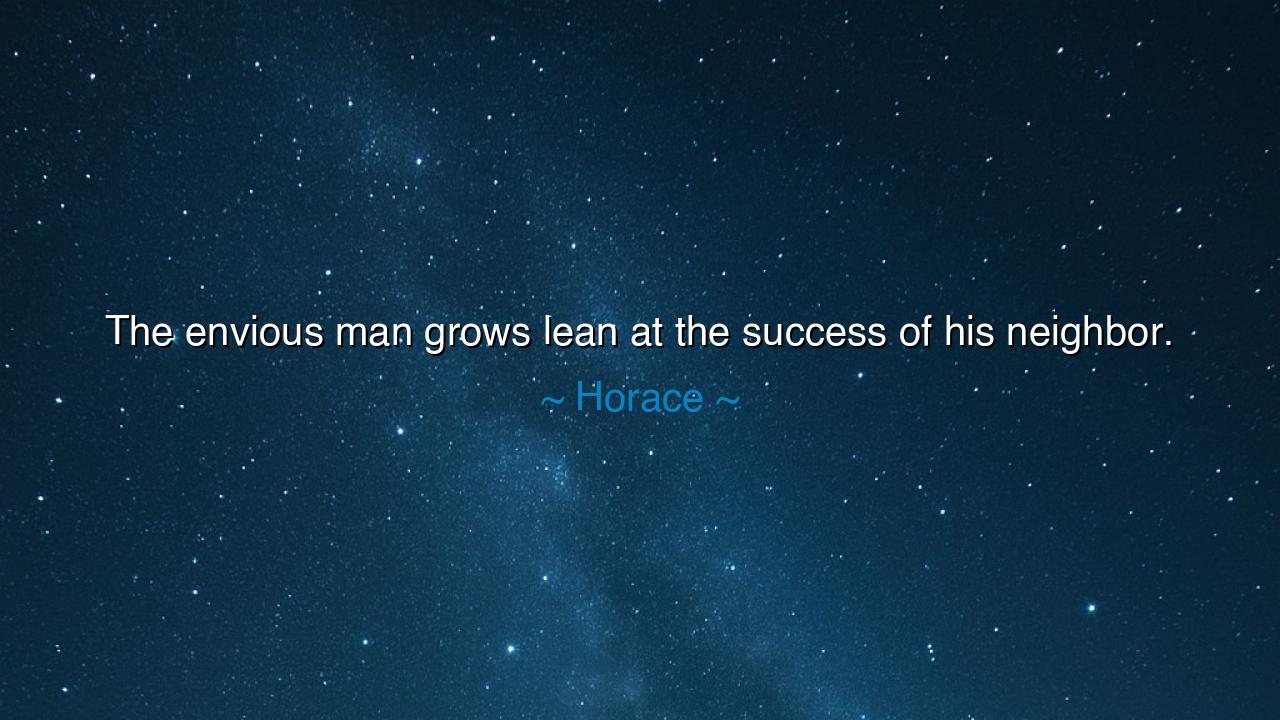
The envious man grows lean at the success of his neighbor.






Horace, the Roman poet whose words echo across the ages, once declared: “The envious man grows lean at the success of his neighbor.” In this, he unveils a truth as old as mankind itself—that envy is a poison that does not wound its target, but the one who drinks it. The envious man, instead of rejoicing at another’s success, devours himself with bitterness. His spirit shrivels, his joy withers, and like one who starves while surrounded by food, he becomes lean not in body alone, but in soul.
The ancients often warned against envy, for they knew it to be a fire that consumes from within. Aristotle called envy the pain felt at another’s good fortune. The Hebrew scriptures declared: “Envy rots the bones.” And in Rome itself, envy was feared as a vice that could unravel friendships, poison families, and even topple empires. Horace captures this destructive force in one vivid image—the neighbor prospers, but the envious man wastes away, as though his very flesh resents the sight of another’s plenty.
History offers many examples of envy’s ruin. Consider the rivalry of Antonio Salieri and Wolfgang Amadeus Mozart, immortalized in tale and legend. Salieri, though himself accomplished, could not bear the effortless genius of Mozart. His envy turned what could have been admiration into torment, and his life became a tale of bitterness. While Mozart’s music soared into eternity, Salieri’s heart “grew lean” at his neighbor’s brilliance. Whether or not every detail of the story is true, the lesson remains eternal: envy cannot create, it can only corrode.
Envy is a strange sickness, for it cannot be satisfied. The envious man does not grow fat on another’s downfall—he merely grows leaner with every new victory he beholds. He is like a shadow feeding on light, diminished each time it shines. Meanwhile, the neighbor he resents may not even notice, continuing on in joy, untouched by the silent venom. Thus envy is doubly foolish: it injures the envious and spares the envied. Horace’s image is not only poetic, but brutally true.
Yet hidden within this warning lies guidance. If envy is poison, then gratitude is its antidote. To rejoice in the success of one’s neighbor is to feast on abundance, to drink from a shared cup of fortune. The wise man does not grow lean when others thrive—he grows stronger, nourished by the joy of collective prosperity. For what is the neighbor’s harvest, if not proof that the soil is fertile? And what is the neighbor’s triumph, if not a reminder that triumph is possible for all?
The lesson, therefore, is clear: do not waste your strength staring at another’s garden with bitterness. Instead, tend to your own soil, and let their blossoms inspire rather than torment you. See their success as a torch that lights your path, not as a flame that dims your own. If you rejoice in others, you will never be hungry; if you envy, you will starve, no matter how much you possess.
Practical wisdom follows: each time envy stirs within you, transform it into action. If you admire your neighbor’s wealth, let it drive you to diligence. If you envy their talent, let it drive you to practice. If you begrudge their honor, let it remind you to live in such a way that honor may find you too. By turning envy into inspiration, you convert poison into fuel, and thus you grow strong rather than lean.
So remember Horace’s words: “The envious man grows lean at the success of his neighbor.” Carry them as a warning, but also as a call to rise above envy. Let others’ victories nourish, not diminish, your spirit. For the man who rejoices in another’s triumph is never without reason to celebrate, and the man who transforms envy into effort becomes not lean, but strong, filled with the abundance of wisdom and peace.






AAdministratorAdministrator
Welcome, honored guests. Please leave a comment, we will respond soon